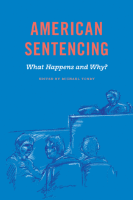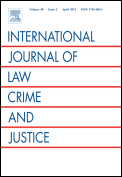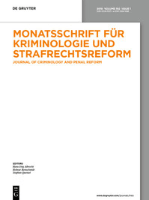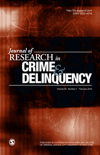
Journal of Criminological Research Policy and Practice
Scope & Guideline
Bridging Theory and Practice in Criminology
Introduction
Aims and Scopes
- Interdisciplinary Research:
The journal encourages interdisciplinary approaches, integrating insights from sociology, psychology, law, and public policy to address complex criminological issues. - Empirical Studies:
A core focus on empirical research methodologies, including qualitative and quantitative studies, to provide evidence-based insights into crime and criminal justice. - Policy Relevance:
The journal aims to inform policy and practice by publishing research that has direct implications for criminal justice systems, law enforcement, and community safety initiatives. - Community and Rehabilitation Focus:
There is a significant emphasis on community-based interventions and rehabilitation programs, particularly in relation to youth, substance abuse, and recidivism prevention. - Mental Health and Crime:
Research exploring the intersection of mental health issues and criminal behavior is a prominent area, reflecting an understanding of the psychological dimensions of crime. - Cultural and Social Factors:
The journal addresses how cultural, socioeconomic, and social factors influence criminal behavior and justice processes, emphasizing the need for context-specific approaches.
Trending and Emerging
- Impact of Technology on Crime:
There is an increasing focus on how technology, including digital forensics and cyberbullying, impacts criminal behavior and law enforcement practices. - Youth and Crime:
Research centered on youth, particularly regarding school dropout, gang involvement, and desistance, is gaining momentum, highlighting the need for targeted interventions. - Mental Health and Criminal Justice:
The intersection of mental health and criminal justice is becoming a prominent theme, with studies examining the experiences of offenders with mental health issues and the implications for rehabilitation. - Community-Based Interventions:
There is a growing trend towards exploring community-based interventions and their effectiveness in preventing recidivism and supporting offender reintegration. - Social Justice and Equity in Criminology:
Emerging discussions around social justice, equity, and the role of cultural and socioeconomic factors in crime are becoming more prevalent, indicating a shift towards more inclusive criminological research.
Declining or Waning
- Traditional Crime Typologies:
There has been a noticeable decrease in studies focused on traditional crime typologies, such as property crime and violent crime, as newer forms of crime take precedence in research. - Generic Policing Strategies:
Research focusing on generic policing strategies without consideration of local context or specific community needs appears to be less frequent, suggesting a move towards more tailored approaches. - Historical Analyses of Crime:
The journal seems to be moving away from historical analyses of crime patterns, with fewer studies exploring the historical context of current criminological issues. - One-dimensional Approaches to Crime Prevention:
There is a declining trend in publications that advocate for one-dimensional crime prevention strategies, reflecting a growing recognition of the complexity of crime and the need for multifaceted solutions.
Similar Journals

INTERNATIONAL JOURNAL OF OFFENDER THERAPY AND COMPARATIVE CRIMINOLOGY
Unveiling critical analyses to inform policy and practice.INTERNATIONAL JOURNAL OF OFFENDER THERAPY AND COMPARATIVE CRIMINOLOGY, published by SAGE PUBLICATIONS INC, is a leading journal in the fields of criminology, psychology, and forensic medicine, with a robust legacy dating back to 1966. With ISSN 0306-624X and E-ISSN 1552-6933, this journal presents innovative research and theoretical discussions that seek to improve offender rehabilitation and comparative criminological studies. The journal’s high-impact contributions have garnered it a prestigious Q1 ranking in Arts and Humanities and a Q2 ranking in Pathology and Forensic Medicine as of 2023, making it a valuable resource for scholars and practitioners alike. Researchers will find the journal's commitment to advancing knowledge through empirical evidence and critical analysis particularly compelling, as it addresses contemporary challenges in offender therapy. Though not an Open Access journal, its diverse scope ensures that readers have access to pivotal insights that drive progress and inform policy in justice and rehabilitation systems. With a focus on interdisciplinary approaches, the journal serves as an essential platform for academics, professionals, and students aiming to deepen their understanding of comparative criminology and its applications.

CRIME LAW AND SOCIAL CHANGE
Unveiling the Impact of Crime on Legal and Social ChangeCRIME LAW AND SOCIAL CHANGE, published by SPRINGER, is a distinguished journal that caters to an interdisciplinary audience including researchers, professionals, and students in the fields of law, social sciences, and forensic medicine. With an ISSN of 0925-4994 and an E-ISSN of 1573-0751, this journal is a vital resource for those looking to explore the dynamic interplay between legal frameworks and societal change, particularly in relation to crime and its implications. As of 2023, it holds a commendable Q2 category ranking in Law and Social Sciences and a Q3 ranking in Pathology and Forensic Medicine, showcasing its impact within these vital domains. With its converged publication years from 1991 to 2024, CRIME LAW AND SOCIAL CHANGE is pivotal in advancing scholarly discourse and offering access to high-quality research that informs both policy and practice. Although not an open access journal, it provides valuable insights to its audience through rigorous peer-reviewed articles, making it an indispensable part of the academic literature in its respective fields.

European Journal of Probation
Elevating scholarly discourse in probation research.The European Journal of Probation is a premier academic publication dedicated to the advancement of knowledge and research in the field of probation and criminal justice. Published by SAGE Publications Ltd in the United Kingdom, this journal proudly holds a Q1 category ranking in Law for 2023, emphasizing its role as a leading platform for scholarly discourse. With a focus on interdisciplinary approaches, the journal serves as a vital resource for researchers, practitioners, and students alike, exploring contemporary issues in probation practice, policy development, and evidence-based interventions. Since its inception in 2009, the European Journal of Probation has fostered a global community of thought leaders who are dedicated to enhancing the efficacy and equity of the probation system. The journal's commitment to quality research and innovative ideas significantly contributes to the ongoing evolution of the legal landscape and social justice. Researchers interested in submitting their work will find a conducive environment that champions high-impact research initiatives.

Trends and Issues in Crime and Criminal Justice
Uncovering trends that shape criminal justice.Trends and Issues in Crime and Criminal Justice is a leading journal in the field of criminology, published by the Australian Institute of Criminology. This esteemed journal, recognized with an H-index that reflects its influence and contribution to the social sciences, particularly law, spans from 2011 to 2024 and is ranked in the Q1 category within its discipline according to the 2023 data. With a Scopus ranking of #123 out of 1025 in the Social Sciences - Law category, placing it in the 88th percentile, it serves as a critical resource for researchers, practitioners, and students alike.
Focused on innovative research and emerging issues within crime and criminal justice, the journal seeks to foster scholarly collaboration and discourse, making it an essential hub for new ideas and evidence-based practices in the field. The journal’s commitment to advancing knowledge and influencing policy ensures that it remains an influential voice in criminological studies, aiming to address pressing issues facing societies globally.

Crime and Justice-A Review of Research
Illuminating pathways to justice and societal understanding.Crime and Justice: A Review of Research is a leading scholarly journal published by the University of Chicago Press, dedicated to advancing knowledge in the fields of sociology and political science, specifically through the lens of crime and justice studies. With an ISSN of 0192-3234 and an E-ISSN of 2153-0416, this academic journal offers a distinguished platform for researchers, practitioners, and students to explore contemporary issues, methodologies, and theoretical advancements within the domain. Ranked in the Q2 category for both sociology and political science as of 2023, it has gained recognition with an impressive Scopus rank of #150 out of 1466 in its field, placing it in the 89th percentile. The journal publishes comprehensive reviews and research articles that inform best practices and policies in crime prevention, law enforcement, and social justice, fostering a deeper understanding of the complexities surrounding crime and societal responses. Though it is not an open-access journal, the insightful research it presents is indispensable for academic discourse and practical application in addressing the multifaceted challenges of crime and justice in contemporary society.

CRIMINOLOGY
Innovating Theories and Practices in Criminology.CRIMINOLOGY, published by WILEY, stands as a leading journal in the fields of Law and Forensic Medicine, with an impressive impact factor that places it in the Q1 quartile for both categories. With its ISSN 0011-1384 and E-ISSN 1745-9125, this esteemed journal has been at the forefront of advancing knowledge and understanding in criminological theories and practices since its inception in 1963, and continues to be relevant through 2024. As of 2023, CRIMINOLOGY is ranked #19 in Social Sciences_ Law and #19 in Medicine_ Pathology and Forensic Medicine, positioning it within the top 2% of its field, making it an essential resource for researchers and professionals alike. Despite not offering open access, it provides invaluable insights into the complexities of crime, law enforcement, and societal impacts, thus shaping the future of criminological research and policy.

International Journal of Law Crime and Justice
Fostering Global Dialogue on Justice and Legal InnovationsThe International Journal of Law Crime and Justice, published by ELSEVIER SCI LTD, serves as a pivotal platform for the dissemination of cutting-edge research in the fields of law, crime, and justice. Established in 2008, the journal has established itself as a reputable source in its domain, holding a respectable Q2 ranking in Law, Political Science and International Relations, as well as Sociology and Political Science as of 2023. With an impact factor reflecting its influence, this journal ranks favorably within the top percentiles of Scopus in several social science categories, making it a critical resource for scholars and practitioners. The journal promotes open access, ensuring that vital research is accessible to a global audience. Scholars interested in the intricate intersection between legal studies, societal challenges, and crime will find the journal's objectives aligned with fostering knowledge and innovation in this dynamic field. Operating from its headquarters in London, England, the journal continues to invite substantial contributions that address contemporary issues and enhance our understanding of law and justice worldwide.

Monatsschrift fur Kriminologie und Strafrechtsreform
Pioneering Discussions in Crime and Legislation.Monatsschrift für Kriminologie und Strafrechtsreform is a prestigious academic journal dedicated to advancing the fields of criminology and legal reform. Published by WALTER DE GRUYTER GMBH in Germany, this journal boasts a significant history since its inception in 1943, continually evolving its focus and scope from 2010 to 2024 to address contemporary issues in law and criminal justice. With an impressive Q2 rating in Law and a ranking in the 46th percentile among social sciences law journals, it serves as a vital resource for researchers, practitioners, and students alike. By publishing innovative articles, critical reviews, and comprehensive studies, the journal aims to foster academic discourse and propel discussions surrounding legislative reforms and criminological theories. Although it does not currently offer open access, readers can obtain valuable insights that contribute to both academic scholarship and practical applications in the legal field, thereby enhancing the understanding of complex societal dynamics related to crime and law enforcement.

JOURNAL OF RESEARCH IN CRIME AND DELINQUENCY
Shaping policies through rigorous examination of crime trends.JOURNAL OF RESEARCH IN CRIME AND DELINQUENCY, published by SAGE PUBLICATIONS INC, stands as a premier outlet for groundbreaking research in the fields of crime and delinquency. With an ISSN of 0022-4278 and an E-ISSN of 1552-731X, this esteemed journal has been disseminating vital knowledge since 1964 and continues to do so with a forward-looking perspective extending to 2024. Renowned for its impactful contributions, the journal ranks in the Q1 quartile of Social Psychology for 2023, reflecting its status among the top-tier publications in the field with a Scopus ranking of 66/310, placing it in the 78th percentile. Though it is not an Open Access journal, it remains a crucial resource for researchers, professionals, and students seeking to deepen their understanding of criminal behavior and social responses. With articles that address current issues and trends, JOURNAL OF RESEARCH IN CRIME AND DELINQUENCY plays an essential role in shaping policies and practices within the criminal justice system and academia.

Revista Criminalidad
Connecting Theory and Practice in Criminal StudiesRevista Criminalidad, published by POLICIA NAC COLOMBIA, is a distinguished academic journal that has been open access since 1958, making critical research in the field of criminology readily available to the global scholarly community. Based in Colombia, this journal serves as a prominent platform for the dissemination of high-quality research on crime, law, and social sciences. Notably categorized in various quartiles for 2023, including Q2 in Arts and Humanities (miscellaneous) and Q3 in Law, it holds respectable rankings in the Scopus database, reflecting its significance and contribution to both academic and practical discourse. The journal invites researchers, professionals, and students to explore its comprehensive scope, spanning vital themes relevant to criminology and public safety, making it an essential resource for those invested in the interplay between society, law, and criminal behavior. For up-to-date research and insights, the journal is accessible at the CENTRO INVESTIGACIONES CRIMINOLOGICAS DIJIN, AVE EL DORADO 75-25, BOGOTA.